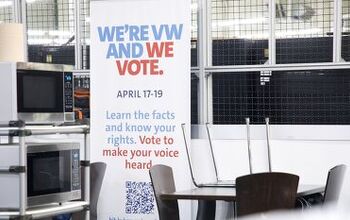NADA Expands Diversity Quotas, Implements New Equity Programs

The National Automobile Dealers Association (NADA) has announced a decision to strengthen diversity quotas by dividing the country into three distinct regions and passing a bylaw amendment that expands the number of at-large seats reserved women and ethnic minorities — moving both from two to three positions.
While the organization had been discussing the matter all summer, with CEO Peter Welch telling NADA members racism and discrimination had “no place in the car business” and needed to be “rooted out,” it has also begun making moves that support new inclusion and equity programs. Roughly 41 percent of the NADA employees are women at present, with another 20 percent representing minorities. But Welch said the group could and should strive to improve those numbers.
In a recent interview with Automotive News, Welch also said NADA had joined the U.S. Chamber of Commerce’s Equality of Opportunity Initiative in a nationwide effort to promote economic inclusion through a specific style of business leadership. Meanwhile, the newly reserved seats will be filled via upcoming board elections this fall through the spring of 2021, increasing NADA’s board headcount from 63 members to 65.
From AN:
Recent actions include an NADA-adopted proclamation affirming its belief that the auto sector — as one of the nation’s most important industries — should be leading the way on work force diversity and committing to stronger support of diversity, inclusion and equity. The proclamation also emphasized the need for organizations such as NADA and the auto retailing industry at large to “rededicate themselves to the goals of increasing diversity, equity and inclusion within their purviews.”
“We have such a big footprint in the industry, and in the retail industry, that we intend to lead by example,” Welch told the outlet. “In one fell swoop, we’re going to assure that we’re going to have more representation.”
Critics of these types of policies claim they’re more divisive than doing nothing and unnecessarily categorize people by race and gender. Some have even gone so far as to say they’re at odds with anti-discrimination/civil-rights laws that prohibit race-based hiring. But advocates suggest these sorts of sweeping changes are necessary to ensure better representation in all industries, even if it means ruffling a few feathers or making certain groups ineligible for a subset of salaried positions.
[Image: LM Photos/Shutterstock]

A staunch consumer advocate tracking industry trends and regulation. Before joining TTAC, Matt spent a decade working for marketing and research firms based in NYC. Clients included several of the world’s largest automakers, global tire brands, and aftermarket part suppliers. Dissatisfied with the corporate world and resentful of having to wear suits everyday, he pivoted to writing about cars. Since then, that man has become an ardent supporter of the right-to-repair movement, been interviewed on the auto industry by national radio broadcasts, driven more rental cars than anyone ever should, participated in amateur rallying events, and received the requisite minimum training as sanctioned by the SCCA. Handy with a wrench, Matt grew up surrounded by Detroit auto workers and managed to get a pizza delivery job before he was legally eligible. He later found himself driving box trucks through Manhattan, guaranteeing future sympathy for actual truckers. He continues to conduct research pertaining to the automotive sector as an independent contractor and has since moved back to his native Michigan, closer to where the cars are born. A contrarian, Matt claims to prefer understeer — stating that front and all-wheel drive vehicles cater best to his driving style.
More by Matt Posky
Latest Car Reviews
Read moreLatest Product Reviews
Read moreRecent Comments
- Redapple2 4 Keys to a Safe, Modern, Prosperous Society1 Cheap Energy2 Meritocracy. The best person gets the job. Regardless.3 Free Speech. Fair and strong press.4 Law and Order. Do a crime. Get punished.One large group is damaging the above 4. The other party holds them as key. You are Iran or Zimbabwe without them.
- Alan Where's Earnest? TX? NM? AR? Must be a new Tesla plant the Earnest plant.
- Alan Change will occur and a sloppy transition to a more environmentally friendly society will occur. There will be plenty of screaming and kicking in the process.I don't know why certain individuals keep on touting that what is put forward will occur. It's all talk and BS, but the transition will occur eventually.This conversation is no different to union demands, does the union always get what they want, or a portion of their demands? Green ideas will be put forward to discuss and debate and an outcome will be had.Hydrogen is the only logical form of renewable energy to power transport in the future. Why? Like oil the materials to manufacture batteries is limited.
- Alan As the established auto manufacturers become better at producing EVs I think Tesla will lay off more workers.In 2019 Tesla held 81% of the US EV market. 2023 it has dwindled to 54% of the US market. If this trend continues Tesla will definitely downsize more.There is one thing that the established auto manufacturers do better than Tesla. That is generate new models. Tesla seems unable to refresh its lineup quick enough against competition. Sort of like why did Sears go broke? Sears was the mail order king, one would think it would of been easier to transition to online sales. Sears couldn't adapt to on line shopping competitively, so Amazon killed it.
- Alan I wonder if China has Great Wall condos?


































Comments
Join the conversation
Well, good to see everyone was properly triggered by this.
Hey, It's The Age of Incompetence. "We'll" do anything to promote any possible criteria for anything at all, as long as it's not competence at anything whatsoever. Since noone in any position of neither wealth nor power, has even the tiniest lick left of that whatsoever anymore, fifty years post complete surrender to the undifferentiated idiocy which is unlimited financialization.